In this article: Learn how to control aphids through companion planting and other natural measures.
Have you ever gone out to your garden and found your tomatoes or broccoli covered in tiny little bugs?
This site contains affiliate links. If you make a purchase using one of these links, I may earn a commission. Please see my disclosure page for more information about cookies collected and our privacy policy.
These tiny insects, called aphids, can wreak havoc in on your crops causing damage and bringing disease. But what can you do to control aphids naturally?
First let’s talk about what aphids are.
What are aphids?
Aphids are small, sap-sucking, soft-bodied insects. And when I say small, I mean tiny. Adults are usually less than ¼ of an inch and the nymphs are even smaller.
Aphids exist in many different colors- green, red, white, yellow, gray….and different aphid species exist for different crops. There are bean aphids, cabbage aphids, melon aphids, and potato aphids to name a few.
Aphids can reproduce quickly and multiple generations will be born in a single season.
Most aphids are wing-less, so they are slow moving so controlling their numbers isn’t too hard if you are attentive.
Aphids will excrete a substance called honeydew as they suck the sap from your plants. You may find your plants sticky with this substance, proof that aphids have been feeding on your plant. You may also find ants wherever you find aphids. Ants will “farm” aphids for this honeydew, as it is one of their food sources.
Pick up a copy of my Companion Planting Guide and Binder to help you design the perfect garden beds with companion planting in mind. Everything you need to know about companion planting in an easy to read format so you can start companion planting sooner!
Control Aphids Naturally With These Plants That Repel Aphids
You may have seen aphids around your garden, and maybe like me, you haven’t really had an issue with them majorly affecting your crops. But in addition to feeding on your plants, aphids also carry disease such as mosaic viruses, that can destroy your crops.
It’s worth taking measures to keep aphids out of your garden or to remove them once they are there. Below are 9 companion plants that can help you control aphids naturally in your garden.
Basil
Basil’s strong scent disrupts the olfactory receptors in aphids and has a repellent effect, which will keep your plants free of aphids.
Basil also acts as a deterrent for some aphid species and will inhibit the feeding behaviors of aphids.
Basil is a great companion for tomatoes, peppers, beans, eggplant, and asparagus to name a few.
Related: How to Grow Basil
Garlic
Aphids, and many other pests, dislike garlic. Garlic’s strong scent disrupts the aphids’ sense of smell, keeping them away from your vegetables.
Garlic can also be crushed and combined with water and a little soap to spray directly on your plants.
Keep garlic away from peas and beans.
Onion
Like garlic, onions are a member of the allium family, most of which will repel pests like aphids.
Onion scent will help control aphids and prevent them from destroying your plants.
Onions are a good companions for brassicas like cabbage, kale, broccoli, and cauliflower. Keep onions away from your beans and peas.
Rosemary
Rosemary is a very fragrant herb that can attract natural enemies of aphids.
Rosemary also contains volatile oils that when emitted have a repellent effect on aphids. Frequent clipping can help release these oils.
Related Reading: How to Get Rid of Spider Mites Naturally
Mint
Mint is another fragrant herb that attracts beneficial insects. Like rosemary, mint contains volatile oils can can help repel aphids.
Mint can take over your garden, so frequent cutting both to release oils and prevent the plant from going to seed can help.
Peppermint essential oil can also be used.
Catnip
Catnip may attract cats but the smell will confuse insects such as aphids.
Catnip will also attract beneficial insects that can help you control aphid infestations.
Learn how to grow catnip here: How to Grow Catnip from Seed
Parsley
Parsley will attract predatory wasps that feed on aphids. These wasps can help reduce aphid populations if you are dealing with infestations or prevent infestations from beginning in the first place.
Nasturtium
Nasturtiums are very attractive to aphids. They work as a trap plant, drawing aphids to them instead of to your vegetable crops.
Check the nasturtiums often and remove and destroy infestations to control the amounts in the garden.
Nasturtiums grow well with most all plants.
Sunflowers
Sunflowers are another trap plant you can add to your garden for aphids. Sunflowers are large and strong and able to withstand aphid attacks.
Other Natural Ways to Control Aphids
Essential Oils to Control Aphids
Essential oils can help control aphids in addition to companion planting or in place of companion planting.
Like in the case of rosemary and mint, it is the oils released that help repel aphids, so using essential oils can be used the same was as an insect repellent.
The following essential oils can be used to help repel aphids in your garden:
Peppermint Oil
Rosemary Oil
Basil Oil
Cedarwood Oil
Check out my article on Essential Oils for Gardening for more information on how to use these oils in the garden.
Beneficial Insects for Controlling Aphids
Luckily for you, there are some ready and waiting beneficial insects to help you fight aphids in your garden.
Ladybugs are the most useful and common predator of aphids. Both adult and larva will feast on aphids all season long. And I have even had ladybugs keep pests off my citrus trees indoors during the winter.
If you don’t have a lot of ladybugs in your area, you can even buy them!
Green Lacewing larva feed on soft bodied insects like aphids. Many wild flowers like Queen Anne’s Lace, goldenrod, and dandelion can draw in lacewings as can many cultivated flowers like cosmos and zinnias. You can also purchase eggs or larva.
Tiny parasitic wasps will lay their eggs on aphids, the larvae will then eat the aphid from the inside. Planting parsley in your garden can help attract these wasps.
Tricks and Traps for Controlling Aphids
Finally, here are a couple other things you can do to control aphids in the garden:
Yellow sticky traps: Aphids are drawn to the color yellow, so placing yellow sticky traps around the plants will draw them in where they will stick. These also work to control cucumber beetles.
Spraying Water: Aphids are tiny and using your garden sprayer directly on the aphids will dislodge them and send them flying. This is only a temporary fix.
Soapy Water: Making a mix of water and soap to spray or wipe on your plants can be effective. Adding in some crushed garlic can add extra protection as well. You can also purchase organic insecticidal soap to spray on your plants.
Do you have a problem with aphids in your garden? Share your stories in the comments!
You May Also Like:
How to Control Cucumber Beetles Naturally
6 Ways to Get Rid of Squash Bugs Naturally
Get Rid of These Common Garden Pests Naturally

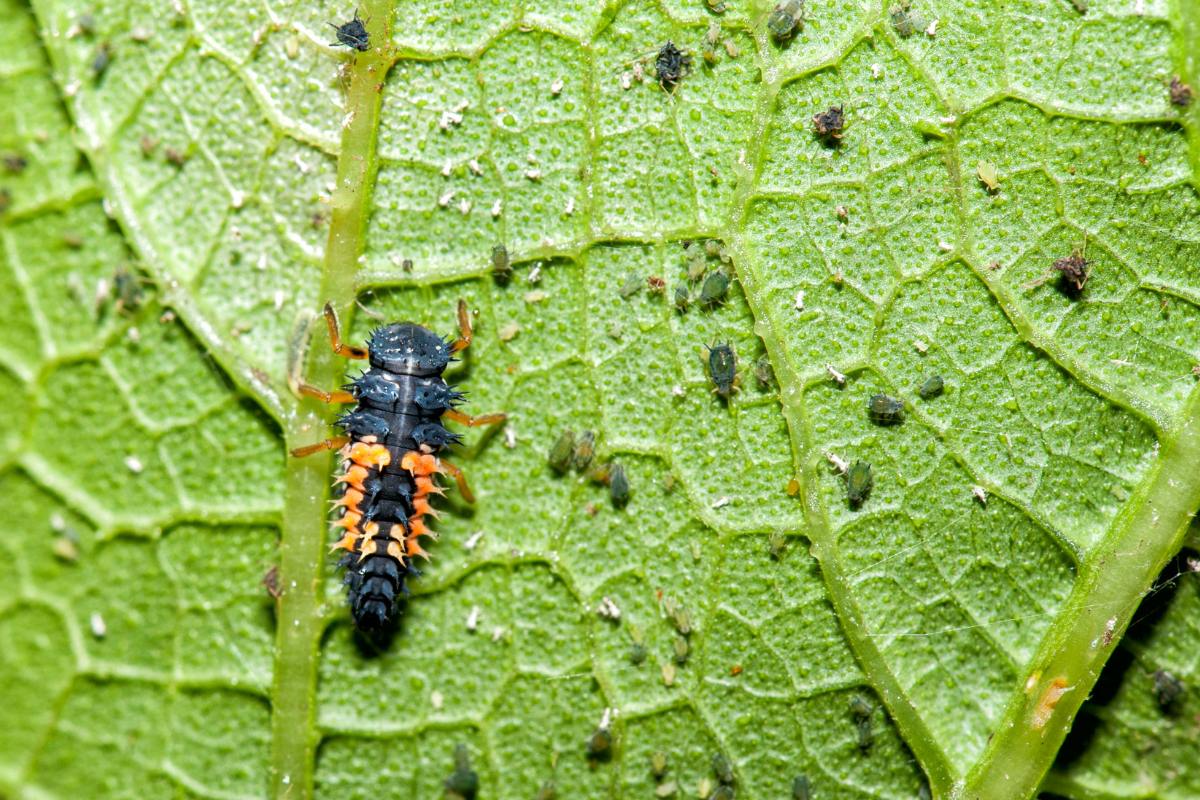
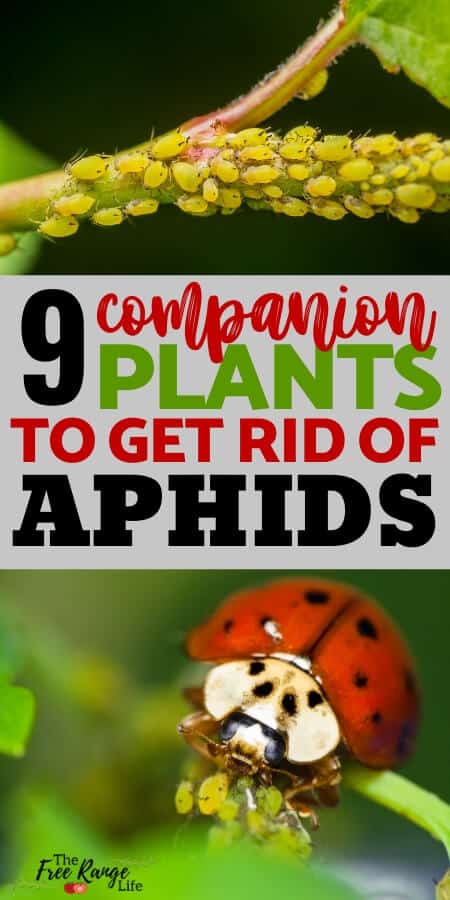
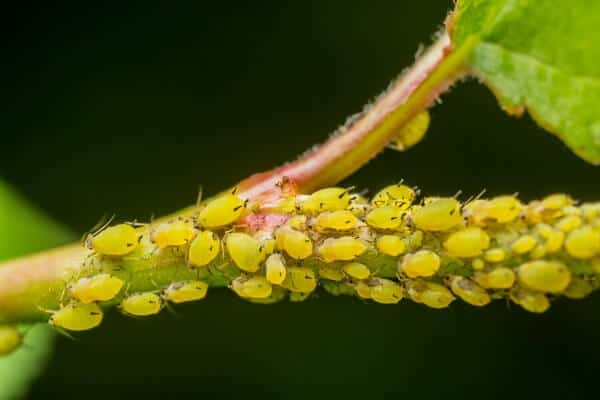
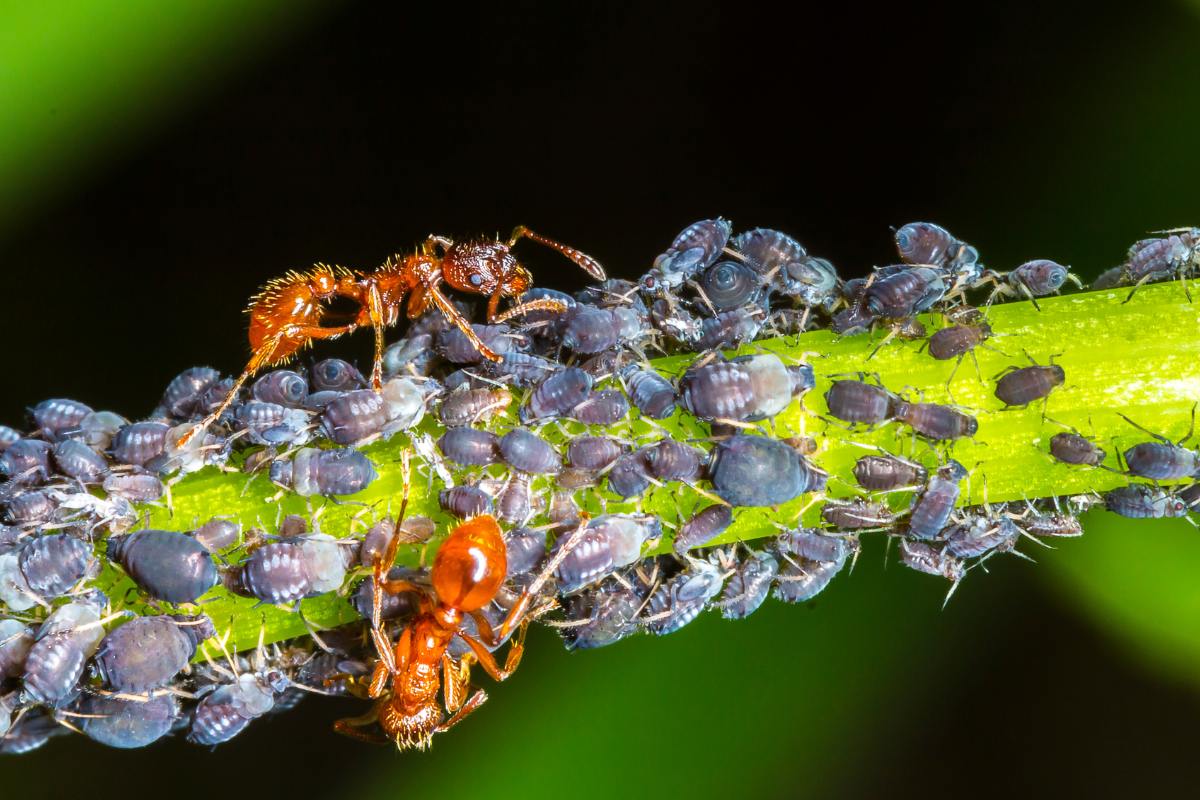
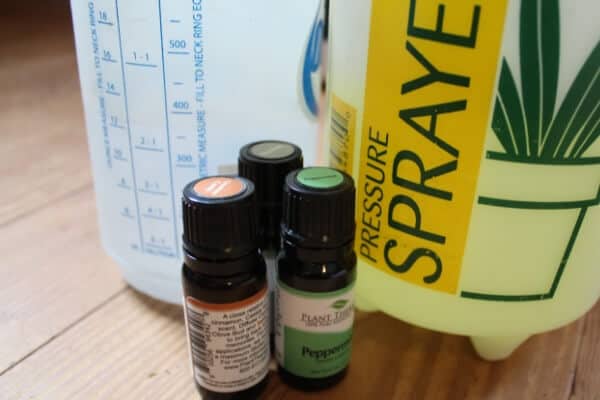
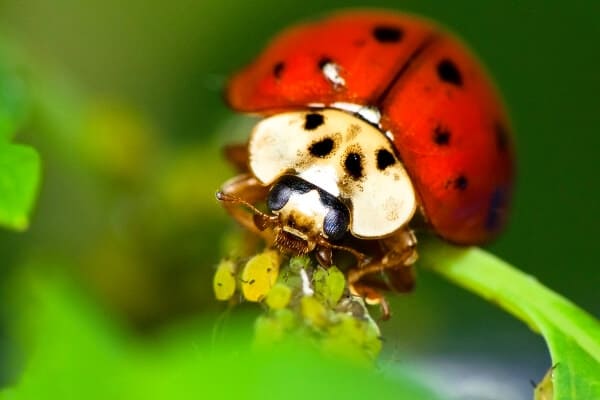

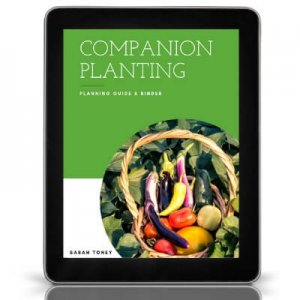
Try strips of banana peel draped over the leaves close to where the aphids are feeding. Worked like a charm on milkweed plants with an oleander aphid infestation. One application was enough.
I have tiny flying bugs and larger what looks like gray black flies but fatter on my strawberry plants. Help
I think more information is needed. What I typically did as a new gardener was Google images of pests for the plant. Then I would look through the images until I found more information
I cut and freeze banana leaves all winter so have enough to spread it in the dirt around plants that attract aphids. Ever since I started doing this I have had no trouble with aphids from leafy plants to roses!
Hi Ruth, do you actually freeze banana leaves? or do you mean the skins from a banana? Or do you live in the tropics that you would have access to banana leaves? TY
I have an indoor lemon tree that is infested with aphids. I have tried soap and water as well as neem oil. Both tend to dry out the leaves causing the mature leaves to fall off. I try to remove with a cloth and water but the smaller leaves break off easily. Can I plant something in the same pot as the lemon tree to deter the aphids? My lemon tree is finally growing and I am so excited but I need to get rid of these bugs.